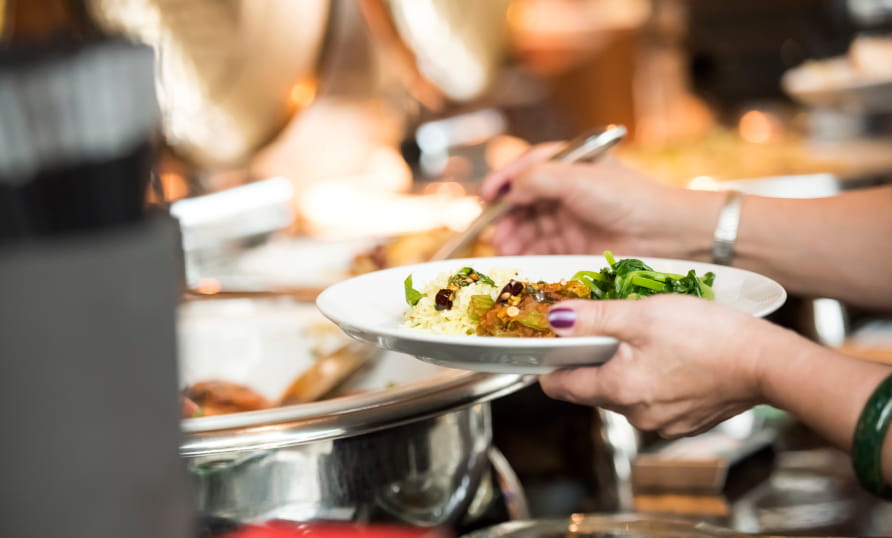IBS trigger foods and prevention

“IBS can affect everyone differently, and the severity of symptoms varies for each individual, but choosing the wrong food can cause painful and uncomfortable symptoms, like bloating, constipation, diarrhea, and abdominal pain or cramping,” says Judy Matusky, RD, LDN, nutrition specialist at Bryn Mawr and Paoli hospitals.
But, with the right preparation, you can navigate holiday buffets with ease. Use the guide below to identify common IBS trigger foods, and their substitutes.
IBS trigger: Large meals, which can cause cramping and diarrhea.
Instead, try: Small meals throughout the day. Keep this in mind especially during holidays or big events, when it can be tempting to indulge.
IBS trigger: Foods that contain dairy, like cheese, butter, milk and ice cream, can worsen IBS symptoms, particularly for those who are lactose-intolerant.
Instead, try: Lactose-free alternatives. Fortunately, there are plenty of lactose-free alternatives to your favorite dairy products. Look for ice cream substitutes like gelato and sorbet, and lactose-free yogurt. Almond milk and rice milk can both be used in place of traditional milk, and vegan cheese or seasoned tofu can help satisfy your cheese cravings without any painful side effects.
IBS trigger: Fried foods. These can wreak havoc on anyone’s digestive system, but the side effects are especially painful for those with IBS. Fried foods like onion rings, French fries, and fried chicken or fish can cause painful abdominal cramping.
Instead, try: Grilled or baked foods. Instead of frying foods, opt for their baked or grilled counterparts, like baked or grilled chicken and fish. For added flavor, use herbs like basil, chili, oregano, parsley, or rosemary to season.
IBS trigger: Beans. Everyone knows that beans are the ultimate accelerator for your digestive system but, unfortunately, they can be difficult to digest. That’s why black beans, chickpeas, kidney beans, lentils, and soy beans are typically not well tolerated.
Instead, try: Unfortunately, there’s no equal substitute for a bean. But you can try other sources of fiber, like brown rice, oats, quinoa, or a small amount of corn as a side dish to your meals.
IBS trigger: Refined foods, like cakes, cookies and pasta, as many of these foods contain wheat, which can trigger IBS symptoms. For this reason, many IBS sufferers follow a gluten-free diet.
Instead, try: Gluten-free products. In recent years, the number of gluten-free products on grocery store shelves has skyrocketed, so you don’t have to feel deprived of choices anymore. Many food manufacturers offer gluten-free versions of popular snacks.
IBS trigger: Fruits that contain high quantities of the sugar fructose, which can cause problems for IBS sufferers. Fruits that are high in fructose include apples, pears, watermelon, and fruit products like fruit juice and dried fruit. Although these foods aren’t off-limits, keep your portion sizes small to limit IBS symptoms.
Instead, try: Fruits that are lower in fructose include bananas, blueberries, cantaloupe, strawberries, grapes, cranberries, oranges, raspberries, and pineapple.
IBS trigger: Vegetables like broccoli, cabbage, Brussels sprouts and asparagus can cause gas, constipation, and diarrhea.
Instead, try: Vegetables that won’t make you run for the restroom, like green beans, carrots, cucumbers, potatoes, spinach, tomatoes, and zucchini.
Treating IBS
Making better nutritional decisions is the first step to managing IBS symptoms, but it’s not the only treatment option.
If you’re struggling with IBS symptoms, talk to your physician about your treatment options. Though some patients are embarrassed to discuss their symptoms, your physician can help you find relief. To schedule an appointment with a specialist at Main Line Health, call 1.866.CALL.MLH (1.866.225.5654).